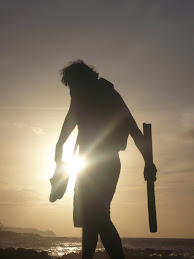- “Fire Coming Down the Mountain”, by The Gorillaz, live in Harlem with Dennis Hoper
- “El Manana”, by The Gorrilaz
Who’s bright idea was it to go spotlighting on the back of the ute for wildlife at midnight on a 3 dog night [as in degrees Centigrade!]?!?
…oh yeah, I was the Ideas-Man last night… the wildlife around these parts is very intelligent; smart enough to stay in on a cold night, anyways… we only spot three wallabies, nothing like the abundant wildlife scattering from our headlights experienced on the way in.
The morning is balmy compared to the windchill of midnight on he truck bed with the midnight wind screaming in my hair, spotlight turned up to the tree canopy searching for glimpse of the elusive, rare, and very rare species of Drop-Bear and Hoop-Snake that are rumoured to be active in these parts.
 I spend it with a steaming cup of tea in one hand, and a slimy tennis ball in the other, exploring the luxury campgrounds again while Maximus leaps and bounds alongside me like an oversized, muscular Mexican Jumping Bean [another rare species fumored to be active in these parts].
I spend it with a steaming cup of tea in one hand, and a slimy tennis ball in the other, exploring the luxury campgrounds again while Maximus leaps and bounds alongside me like an oversized, muscular Mexican Jumping Bean [another rare species fumored to be active in these parts].Today’s mission is to head back into Ulverstone in search of sushi supplies. Aoba’s arrival has sparked my culinary imagination, and I’ve offered to gather the necessary ingredients to make okonomyaki, a delicious sort of Japanese savory pancake made with shredded cabbage, batter, minced beef or pork, Japanese mayonaise, bonito flakes, and a special okonomyaki sauce that is like a mild teriyaki.
Ulverstone by daylight has quite a different character; it is Sunday so the main street is empty and the church’s parking lot is full. We find a morning latte at Smiley’s café, where we meet none other than Mr. Smiley himself, who amuses himself by attempting to welcome us with his best Caadian accent. “Hau wood yoo like yore coafeeee then, ay, young laydeeee?” he drawls, then laughs heartily at his own joke. Aussies love Canadians…
The supermarket doesn’t carry the Japanese batter mix and other special ingredients for us to make okonomyaki – I forget that we are in rural Tasmania. We are surprised to learn that nobody in town sells fresh fish, and so head down the road to Penguin in search of good sushi.
 The road to Penguin follows an old railway track along coast, just a few feet from the rocky beaches, and as the sun glints and sparkles off the blue water I feel like I am driving through the opening scene in a roadtrip movie. The town of Penguin is nestled into a small nook in the coast and has the feel of a lazy coastal holiday town. There are winged tuxedos everywhere on the main street, cute and kitschy, all grinning and winking, and one in particular is very happy to see The Canadian.
The road to Penguin follows an old railway track along coast, just a few feet from the rocky beaches, and as the sun glints and sparkles off the blue water I feel like I am driving through the opening scene in a roadtrip movie. The town of Penguin is nestled into a small nook in the coast and has the feel of a lazy coastal holiday town. There are winged tuxedos everywhere on the main street, cute and kitschy, all grinning and winking, and one in particular is very happy to see The Canadian.There is no fresh fish to be found here either, so we press on to the port of Burnie, which is said to have a deep water harbor to rival Devonport and Hobart. This is a logging, woodchipping, and papermill town, and the first thing to be spotted as we round the corner and approach the town are three massive piles of woodchip sitting on the docks, each at least 5 stories high.
Peter tells us later that he has seen miles and miles of woodchip piles twice as large sitting idle deep in the forests around his property. The effects of the Global Finanical Crisis [known in Oz as "GFC" - sounds like a really bad fast food restaurant chain...] are felt even in the wilderness of Tasmania, just waiting for a stray spark to send them up like piles of gunpowder in a Loony Toons cartoon gone tragically wrong.
The stark contrast of the pristeen wilderness we have come down from, to the huge industrial machines and belching smokestacks that are in and around this town is disconcerting. It sparks an inner dialogue questioning how economic and environmental sustainability can ever reconcile each other when we live in a system that places financial profitability and growth above all else.
The road back is full of questions, and as I enjoy fresh sushi with new friends this night, I am thankful for being with good people surrounded by wilderness.
Suddenly, it has become much easier to see why Peter made the decision to come build a self-sufficient life for his family, “luxury camping” in the bush.





No comments:
Post a Comment